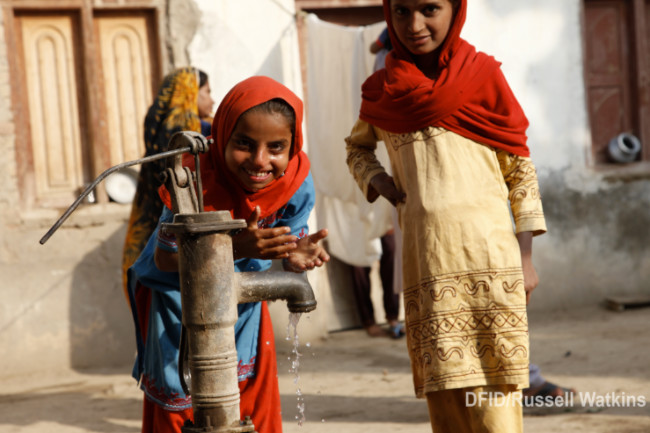
Promoting evidence-informed sanitation behaviour change in low- and middle-income countries

Context
Safe water, adequate sanitation and hygiene can avert an estimated 9 per cent of the global disease burden and about 6 per cent of all mortality. Several approaches have been developed over the past two decades that promote WASH interventions and sustain behaviour change for healthy WASH behaviours. While the evidence base for these interventions in low- and middle-income countries is fairly extensive, there are no synthesis studies about behavioural change approaches in WASH interventions.
3ie, in partnership with the Water Supply and Sanitation Collaborative Council, supported researchers at Belgian Red Cross’s Centre for Evidence-Based Practice to conduct a systematic review to help to fill this evidence gap. The systematic review looked at which promotional approaches might change handwashing and sanitation behaviour, and which implementation factors affect the success or failure of such promotional approaches.
Evidence
The systematic review found that promotional approaches can be effective at improving latrine use, safe faeces disposal, handwashing with soap, and open defecation. No single approach was most effective, with several promotional elements shown to induce behaviour change. These include (1) community involvement in the context of sanitation programmes; (2) social marketing in the context of sanitation programmes; (3) psychosocial approaches to promotion in the context of handwashing interventions; and (4) use of interpersonal communication as part of the communication strategy.
The researchers also highlighted that rigorous experimental studies on the effectiveness of handwashing and sanitation promotional approaches were still lacking, especially for social marketing, sanitation and hygiene messaging, and psychosocial promotion interventions.
Evidence impacts
Type of impact: Improve the culture of evidence use
When decision makers or implementers demonstrate positive attitudinal changes towards evidence use or towards information the research team provides. Examples include strengthening monitoring and evaluation systems, increasing understanding of evidence and openness to using it, integrating these systems more firmly into programming or commissioning another evaluation or review.
This is one of 3ie’s seven types of evidence use. Impact types are based on what we find in the monitoring data for an evaluation or review. Due to the nature of evidence-informed decision-making and action, 3ie looks for verifiable contributions that our evidence makes, not attribution.
Read our complete evidence impact typology and verification approach here.
Close windowEvidence gaps highlighted by the 3ie-supported systematic review prompted the Belgian Red Cross to design interventions that include contextualised behaviour science-based components, as well as commission a long-term evaluation in Tanzania. The published protocol for the evaluation cites the review’s findings.
‘There are all these actors in the WASH sectors who have been doing projects and programmes for years. Instead of piloting interventions, it's actually an added value when you measure the impact on these ongoing projects. Working with the Centre for Evidence-Based Practice influenced us to improve our PMER [Planning, Monitoring, Evaluation and Reporting] approach to enable better impact measurement.’
Type of impact: Inform discussions of policies and programs
When subsequent phases of the evaluated programme or policy draw from the findings of the evaluation or review, and/or the study team participates in informing the design of a subsequent phase.
This is one of 3ie’s seven types of evidence use. Impact types are based on what we find in the monitoring data for an evaluation or review. Due to the nature of evidence-informed decision-making and action, 3ie looks for verifiable contributions that our evidence makes, not attribution.
Read our complete evidence impact typology and verification approach here.
Close windowAccording to the operations team, findings of the review by Centre for Evidence-Based Practice’s Buck and colleagues (2017) informed the Belgian Red Cross’s decision to continue funding community-based WASH behaviour change interventions in its recent five-year development project in several countries in East Africa.
Type of impact: Inform global guidelines and policy discussions
When findings from an evaluation or review can be traced to discussions or actions. Examples include governments or multilateral or bilateral donors’ mentioning the findings to inform policy or programming. To date, we have only one case of an individual impact evaluation informing global health guidelines. WHO guidelines require that the guidance is based on randomised evaluation evidence.
This is one of 3ie’s seven types of evidence use. Impact types are based on what we find in the monitoring data for an evaluation or review. Due to the nature of evidence-informed decision-making and action, 3ie looks for verifiable contributions that our evidence makes, not attribution.
Read our complete evidence impact typology and verification approach here.
Close windowReview findings have also been cited in international policy discussions. A 2018 World Bank evidence brief titled ‘Empowering households and individuals to co-produce positive health outcomes: for quality care amidst infrastructure and resource constraints’ drew on review findings to identify the top handwashing and sanitation behaviour change approaches. The brief is part of the Bank's Frontline Health First series, intended to introduce policymakers to relevant opportunities for reform and context-appropriate innovations.
A summary of the review has also been included in a 2020 collection of evidence relevant to COVID-19 response produced by Foreign, Commonwealth and Development Office-funded NGO Evidence Aid and translated into several languages to inform global humanitarian responses to the COVID-19 pandemic.
Suggested citation
International Initiative for Impact Evaluation (3ie), 2020. Promoting evidence-informed sanitation behaviour change in low- and middle-income countries [online summary], Evidence Impact Summaries. New Delhi: 3ie.
Evidence impact summaries aim to demonstrate and encourage the use of evidence to inform programming and policymaking. These reflect the information available to 3ie at the time of posting. Since several factors influence policymaking, the summaries highlight contributions of evidence rather than endorsing a policy or decision or claiming that it can be attributed solely to evidence. If you have any suggestions or updates to improve this summary, please write to influence@3ieimpact.org